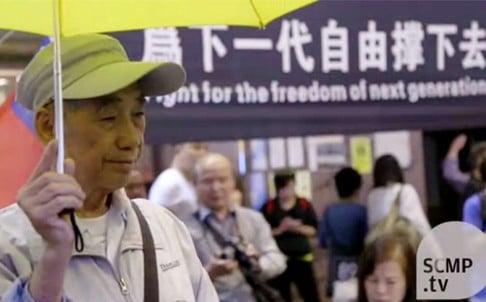Armed with yellow umbrella and loudhailer, former cab driver Benedict Ng Pun-tuk fights for ‘real democracy’, come wind or rain
Eighty-year-old Benedict Ng Pun-tuk is a familiar sight on Mong Kok’s busiest street where, armed with a yellow umbrella and loudhailer, he gathers with a group of protestors every night to fight for “real democracy”.
Regardless of the weather, Ng leads the group from their meeting point outside the Broadway Cinema at Sai Yeung Choi Street South, nicknamed Democracy Street, on a march down Argyle Street and Nathan Street every evening.
Friday will be the 500th consecutive day he has maintained his vigil, which began at the end of the Occupy Central movement in 2014.
Meet the 80-year-old who has protested every night in Mong Kok since the Occupy movement ended
There have been threats, attacks and harassment from suspected triad members, police and the “blue ribbon” supporters of the pro-establishment camp in the past 500 days. But the former taxi driver remains unfazed, saying nothing can drive them away.
“No matter if it was typhoon No 8 or Lunar New Year, every night we have gathered around here with yellow umbrellas as our trademark,” he said.
“I want to tend the flame of democracy and keep it burning,” he added.
During the two-month-long street occupation, the single retiree slept overnight on the street at Nathan Road every night, braving the winter chill and rough weather to show his support for democracy.
The civil disobedience movement, which began on September 28, 2014, called on thousands of protesters to block roads and paralyse traffic to demand what they called “real democracy”, not the kind decreed by Beijing.
Once Occupy was over, Ng and other diehard supporters transformed themselves into “Mong Kok shoppers”, conducting “shopping tour” protests.
The “shopping tours” were a way to continue the fight after Occupy in response to Chief Executive Leung Chun-ying urging people to support Mong Kok businesses.
On Friday, the “Mong Kok shoppers” will throw a party at their protest zone to mark the anniversary, festooned with a yellow flag with the words “I want real universal suffrage” and a poster featuring the face of the chief executive stuck to the floor and trodden on by countless passers-by.
Ng said he was fighting for the nomination of chief executive candidates by the public and the elimination of all 35 functional constituency seats in the Legislative Council.
“I will persist until we have real universal suffrage. We need to fight for the next generation. No one can separate us, whoever they are,” he said.
For Ng, a devout Catholic, the fight for democracy in Hong Kong began under Chinese communist rule.
He was a victim of political persecution during the Cultural Revolution spanning the 1960s to 1976, when millions were persecuted in the violent struggles against “counter-revolutionary activity” and suffered a wide range of abuses including public humiliation, arbitrary imprisonment, torture, sustained harassment and seizure of property by the authorities.
Born to a Catholic peasant family in 1936 on the Leizhou Peninsula in Guangdong province, Ng left his family and fled to Hong Kong in 1957 via Vietnam with his classmates as the Communist Party started to crackdown on Christians and churches.
But a return visit to the mainland in March 1969 to care for his ailing father saw him arrested and jailed during a police investigation.
“The authorities labelled me a cult member and accused me of being a traitor and a spy for the British government,” he said.
Ng was released nine months later but immediately placed under house arrest in his hometown for almost three years.
“They wanted to confine me to my family farm in order to have me brainwashed so I couldn’t go out to influence other people with my religious beliefs,” he said.
After the death of Lin Biao, then vice-premier of China and a major force of the Cultural Revolution, in September 1971, Ng was allowed to return to Hong Kong the next year as the mainland authorities recognised he had been wronged.
“I still remember clearly it was on November 28, 1972. When I walked across the Lo Wu Bridge setting foot on Hong Kong territory, I felt I was finally a free man,” he said.
“It was like escaping from a prisoner’s cage. I felt a gush of happiness inside me,” he added.
Ng said it was the June 4 crackdown in 1989 that sparked his political activism.
Taking part in a protest for the first time, he joined a million Hong Kong people taking to the streets to condemn Beijing’s bloody crackdown on student protestors who demanded democratic and other reforms in Tiananmen Square.
Since then, he has participated in every major pro-democracy protest in the city. In particular, the Occupy movement made him understand the importance of raising public awareness through an unremitting fight.
“It doesn’t matter if the Occupy movement didn’t come to fruition,” Ng said.
“At least we awoke greater public awareness, as evidenced by the rising number of political groups. Democracy will not drop from the sky, but emerge through a process of development.”
He said he sensed a change in the political climate towards a more radical approach, such as brick-throwing during the recent Mong Kok clashes and the formation of the Hong Kong National Party, which advocates the city’s independence.
“I don’t know if this is a good thing or not, but this is a sign that people are stepping up their fight for democracy,” Ng said.
However, he admitted that the number of “shoppers” has been declining, from several thousand to about 30 hard-core members.
“I won’t give up. I’ll fight until the end as long as the flame in my heart is still burning,” he said.
http://m.scmp.com/news/hong-kong/politics/article/1934585/eighty-year-old-hongkonger-has-protested-mong-kok-every
